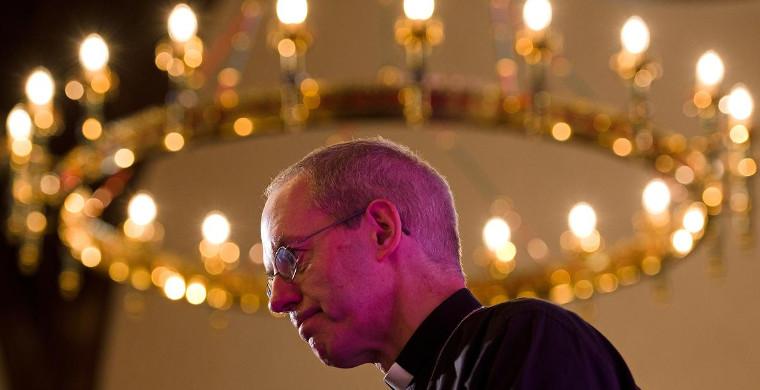Book review: Reimagining Britain: Foundations of Hope by Justin Welby
The Archbishop of Canterbury pulls his punches in his prescription for the future of Britain.
By Rod Liddle
https://www.thetimes.co.uk/ar
March 11 2018,
The Archbishop of Canterbury has had a look at Britain and does not much like what he sees. A broken and polarised country in which the poor continue to get poorer, with an education system that rewards the well-off and the privileged and a National Health Service starved of funding.
This book is his blueprint for how we might heal the many divides in our country. It is kind of one part Jesus Christ, three parts Ernest Bevin and five parts a Guardian op-ed feature.
Time and again Welby brings us back to 1945, the last occasion, he suggests, when Britain was forced to reimagine itself. His enthusiasm for William Beveridge, the 1944 Education Act, the NHS and the massive housebuilding programme of the postwar Attlee government remains utterly undimmed. Those who are inclined to see the welfare state as the incubator of many of our present ills will not find much succour in these pages.
This is instead a kind of blue Labour manifesto that emphasises the Christian concepts of "virtue" and the "common good", and recognises that our country was built upon Christian teaching and morality -- and that this is not altogether a bad thing, by and large.
Welby writes with passion, if not flair, and the government will not enjoy his observations on austerity, which he sees as "a word that almost invariably conceals the crushing of the weak". However, when he is not kicking the government in the shins, he has a tendency to pull his punches -- ironically, on the very subjects on which one might expect a churchman to have strong and deep-rooted opinions, such as the family.
Welby is not the sort of man to grasp a nettle firmly. He is perhaps the sort of man who will poke at it tentatively with his finger, a sure way of getting stung.
For this reason, his chapter on the family is the weakest in the book. Welby argues that while we shouldn't collude in "idolising" families -- an odd caveat for a Christian to make, you might argue --they are nonetheless, as Catholic social teaching has it, the "fundamental nucleus" of society. They are, as Welby puts it, a "gift of God ... bearing burdens, supporting the vulnerable". He identifies that we need good families, but one is never terribly sure what the chap means by this.
He has nothing at all to say, for instance, about the costs to society and, more important, children, incurred by the decline in marriage and the rise of single-parent families, despite the fact that this is one area where the church and science are in utter accord: the best outcomes for children, and society, result from kids being brought up by their genetic mother and father who are married, not merely cohabiting. Not by divorcees, not by foster carers and certainly not by single parents.
Yet despite his insistence that we should incentivise "good practice" regarding the family, he is too hamstrung by his liberal convictions to spell out exactly what should be meant by good practice. Couldn't we "incentivise" monogamous heterosexual marriage a bit more, Justin? But instead, we are left with a few recommendations about giving grandparents certain rights in divorce cases sensible enough) and tax incentives for carers.
The dreaded LGBTQI+ issue arises in this chapter, too -- an issue Welby has tiptoed around during his tenure as archbish, and with good reason, given the divisions it occasions within his fractious and deliquescing communion. In the book, though, he is more forthright and pristinely modernist, praising the advent of gay marriages and castigating the British Empire for having inculcated in "more traditional" countries (I think by "traditional" he means "backwards" and is referring to Uganda) a hostility towards the LGBTQI+ community. Our fault, then, not theirs.
Sometimes the bien-pensant doublespeak in this book reaches a point of hilarity, as in the paroxysms turned by a modern liberal when dealing with homosexuality and what Christian (oh, and Muslim) Africa think about homosexuality. Exculpate the gays, exculpate the Africans, blame the Brits.
There is less vacillating and sidestepping elsewhere. He is excellent when dealing with the iniquities in our education system, which lead to the children of the most affluent winning places at the top universities while the poor, white underclass are left the least equipped to find decent jobs in a modern economy.
And yet even here the solution is simple: better funding. Well, sure. The money Tony Blair's Labour government poured into failing London comprehensives worked, without question: the capital's secondary schools are now the best in the country. But it is not the only answer. Our schools, he says, need to "generate inspiration and aspiration. They need to enable the creation of resilience and sustainability."
I genuinely don't have a clue what he means by that last sentence; it is fashionable guff and essentially meaningless. What about selection? What about free schools? Scarcely a word.
Welby thinks we should pay a bit more attention to mental health -- unsurprisingly, as the Archbishop himself and his daughter Katherine have admitted to bouts of severe depression. He wants more money for the NHS. He wants more houses to be built and -- sensibly enough -- for houses to create proper communities. He thinks universities should allow more freedom of expression. All well and good.
But the only moral imperative I take from this is that the government should spend more money -- well, sure, sure. But so easy to say. And, sadly, much of the rest is a painful equivocation.














